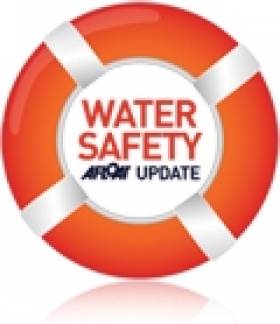Displaying items by tag: Jack Kavanagh
#WaterSafety - Recreational divers must follow safety guidelines to the letter, a coroner has urged during the inquest into the death of two diving enthusiasts off West Cork last summer.
As previously reported on Afloat.ie, the two men in their 60s, who were understood to be experienced divers, died while exploring the wreck of a German U-boat off Castlehaven on 2 July last.
Cork City coroner Dr Myra Cullinane this week ruled misadventure in the deaths of 65-year-old Stephen Clarke from Surrey and 61-year-old Jonathan Scott from Western Australia, as the Irish Examiner reports.
The inquest heard that both men had overstayed their 'bottom time' at the wreck 42 metres below the surface and succumbed to the bends after making a rapid ascent.
It was also found that the duo's air regulators were not appropriate for operation at such depths, which would have made breathing difficult.
The Irish Examiner has much more on the story HERE.
Elsewhere, an Irish student who was paralysed while diving into the water at a Portuguese beach in 2012 has spoken of the moment that changed his life forever.
Jack Kavanagh was an experienced lifeguard and surfing instructor before the dive into a hidden sandbank that broke his neck with a "little click".
But as the 22-year-old tells the Irish Mirror: "I was very calm. I knew immediately what had happened. I was so used to being in the water so I didn't panic at all... As a lifeguard I had done training, I knew all the signs and symptoms."
Since then he has defied the preconceived notions of his disability, returning to Trinity to complete his pharmacy studies – and next week is headed to the States with friends for a J1 working holiday.
And that's not to mention the 'Sail for Jack' organised by the Royal St George last August to raise funds for his specialised supports and treatment.
'Sail for Jack' Race at Royal St. George YC Raises Funds for the Jack Kavanagh Trust
#sailforjack – 22 year old Pharmacy student Jack Kavanagh's life changed completely two years ago when he had an accident which resulted in him being paralysed from the armpits down. Orla Callender supported by Rosemary Dawson organised a pursuit sailing race, hosted by the Royal St. George Yacht Club, on 29th August to raise funds to support the specialised supports and treatments which Jack requires.
On the evening of the race there was quite a lot of weather. At 16.00hrs. it was sunny with a breeze of about 12 knots gusting to 21 knots. By 17.30hrs there was steady drizzle, with only 100m. visibility, and average wind speed of 25 knots with gusts of 27knots. 'Terriblee' the committee boat was stationed by Vincent Delany, officer-of-the-day, off the harbour mouth. First competitor on the course was Margaret Hannan's Squib, 'Free Trader'. She was quickly followed by the Sailing-in-Dublin's 'Vago' who found the conditions challenging. A decision was made immediately to abandon the dinghy element of the race. The dinghies sailed back to the safety of the harbour and 'blemmed' around at high speed. The Glens all decided that the conditions were not appropriate to an enjoyable race, and returned to their moorings. However the race started soon after 18.30hrs. with Squib 'Sidewinder' with special athlete Tomas on board as lead boat. They were followed by a variety of day boats and cruisers. One hour later, having navigated the mist to Middle, New Ross, and East Marks, three boats approached the finish line together. The rain was clearing and a rainbow appeared to the east. The leaders were 'Sidewinder', Rupert Bowen, Rupert Westrup and Tomas, Squib 'Perfection' with Jill Fleming, Conor O'Leary and special athlete Declan, 'Wow' George Sisk's 42 footer which charged through the fleet with fabulous efficiency. 'Sidewinder' finished at 19.28.12hrs followed by 'Wow' at 19.28.30, only 18 seconds later. What a close finish for two boats so different in style!
At the prize giving, Vice-Commodore Justin Mc.Kenna presented many valuable prizes which had been provided by generous sponsors:
1st. Boat- 'Sidewinder' Rupert Bowen, Rupert Westrup and Tomas- A tidal Clock.
1st Special athlete- Tomas in 'Sidewinder'- Theatre tickets for the Pavilion Theatre.
1st. Cruiser- 'Wow' George Sisk and crew- Golfing voucher.
2nd. Cruiser- 'September Song' – Stephanie Burke and family who managed to sail the entire course without putting up their Sigma 33 mainsail.- Voucher for David Lloyd gym.
3rd. Cruiser- 'Sarnia' – A voucher for the Royal Marine Hotel.
4th. Cruiser- 'Bendemeer' Gerry Kinsella and crew- Voucher for The Butler's Pantry.
2nd. Day boat- RIYC 1720- Voucher for Fingal Sailing School.
Special award for bravery despite sailing the wrong course- 'Perfection' Jill Fleming with Conor O'Leary and Declan Johnston- A holistic wellness voucher.
2nd. Special athlete- Declan Johnston- Theatre tickets for the Pavilion Theatre.
Special award for surviving such tough conditions- 'Free Trader' Margaret Hannan and Ray Greene- A hairdresser voucher.






























































